
THE VOICE OF INTERNATIONAL LITHUANIA
|
VilNews has its own Google archive! Type a word in the above search box to find any article.
You can also follow us on Facebook. We have two different pages. Click to open and join.
|
Author Archive
- Posted by - (0) Comment
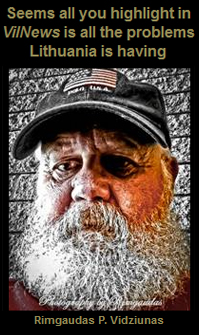
Dear Aage,
Seems all you have been highlighting in VilNews is all the problems Lithuania is having.
I'm tired of seeing it and don't read 'bad news" any more. "Bad News" depresses me.
Anything "good" going on in Lithuania. For the next 30 days, I challenge you and the writers to post positive articles about my "motherland".
Rimgaudas P. Vidziunas aka "Rim"
Mesa, Arizona, USA
- Bookmark :
- Digg
- del.icio.us
- Stumbleupon
- Redit it
- Posted by - (0) Comment

The passenger traffic at Vilnius International Airport (VIA) has shown a steady upward trend since the previous year, and the result of June this year was the best throughout all years of the airport’s operation.
In June 2012, the airport handled 228.6 thousand passengers, which surpassed the result of June 2011 by 23%. Until now, the best monthly result was achieved in August 2008, when the number of passengers soared to 224.6 thousand. 2,775 flights were operated in the first summer month, showing a 7% growth.
The growth in regular flights accounted for 25%, while charter flights witnessed a 15% increase. The most popular June destinations were London, Frankfurt, Riga, Antalya, Copenhagen and Moscow.
971 thousand passengers were handled in six months this year, showing a 36% growth in passenger numbers compared to the same period in 2011.
“The successful results of the first half of the year reached the peak on 15 June, when Vilnius Airport beat the record of the passengers handled in one day: 4,498 passengers departed from Vilnius Airport and 4,530 passengers arrived at Vilnius Airport, totalling 9,028 passengers handled by the airport,” Tomas Vaišvila, VIA Managing Director, commented the results. “Most passengers arrived from Riga – 371, while the number of departing passengers was the highest on London route – 490. A large part of passengers – 1834 – travelled to holiday destinations – Sicily, Cyprus, Turkey, and Greece.”
Until now, the highest number of passengers handled in one day was 8,682 passengers on 17 August 2008.
In 2007 Vilnius Airport handled 1,717 million passengers, 2,048 million in 2008, 1,308 million in 2009, 1,373 million in 2010, and 1,715 million in 2011. It is expected to reach a 25% growth in passenger traffic in 2012. 20 airlines operate regular flights from Vilnius Airport on as many as 39 direct routes.
- Bookmark :
- Digg
- del.icio.us
- Stumbleupon
- Redit it
- Posted by - (0) Comment
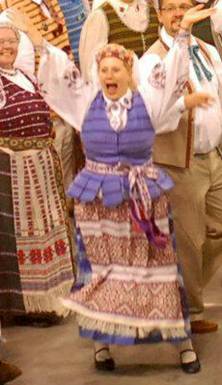
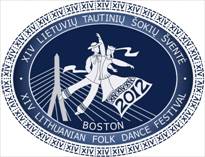
Šokių Šventė
Boston, USA, 1 July 2012
I have just returned from Sokiu Svente and it was an incredibly beautiful and exhilarating experience which reinforced my pride as a Lithuanian. The dances, songs, costumes, art, all of it validates the creative spirit that keeps generations connected and inspired. And kudos to the Boston for putting together an incredibly smooth and successful event.
- Bookmark :
- Digg
- del.icio.us
- Stumbleupon
- Redit it
We may be “just” American Lithuanians, but our ancestors have entrusted us with a heritage which we cherish with every ounce of our being
- Posted by - (1) Comment
![]()

May our spirit and energy and LOVE for Lietuva make its way in a POSITIVE direction to the streets, farms, dunes of Lietuva. We may be "just" American Lithuanians, but our ancestors have entrusted us with a heritage which we cherish with every ounce of our being. "I SVEIKATA!":)
Jenifer C. Dillis
- Bookmark :
- Digg
- del.icio.us
- Stumbleupon
- Redit it
Is Lithuanian mafia regaining strength?
- Posted by - (0) Comment

Andy Hernandez after the mafia attack last Friday.
My friend, Filipino Andy Hernandez, a veteran Newsweek war photographer who now lives in Lithuania, where he, among other things, makes his living by owning and operating a handful of restaurants, was brutally beaten in one of his own restaurants last Friday.
The attack on Andy and his wife appears to be racially motivated, and unfortunately, racism is a very, very serious problem in present day Lithuania.
It seems, also, as if the recession has provided various mafia groups more room and more power. Smuggling and production of drugs, human trafficking, prostitution and other things with a basis in Lithuanian mafia groups is an increasingly serious problem for Europe.
The assault on Andy and his wife is only the tip of an iceberg that is growing ever greater.
- Bookmark :
- Digg
- del.icio.us
- Stumbleupon
- Redit it
Is Lithuanian mafia regaining strength?
- Posted by - (1) Comment
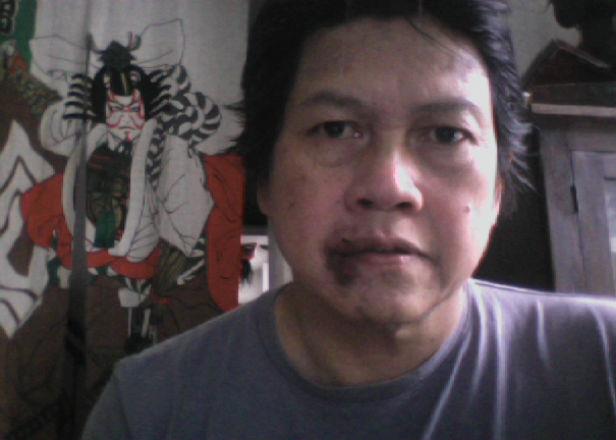
Andy Hernandez after the mafia attack last Friday.
My friend, Filipino Andy Hernandez, a veteran Newsweek war photographer who now lives in Lithuania, where he, among other things, makes his living by owning and operating a handful of restaurants, was brutally beaten in one of his own restaurants last Friday.
The attack on Andy and his wife appears to be racially motivated, and unfortunately, racism is a very, very serious problem in present day Lithuania.
It seems, also, as if the recession has provided various mafia groups more room and more power. Smuggling and production of drugs, human trafficking, prostitution and other things with a basis in Lithuanian mafia groups is an increasingly serious problem for Europe.
The assault on Andy and his wife is only the tip of an iceberg that is growing ever greater.
After the attack, Andy told the Philippine website Rappler via email that it was a mafia boss who had harassed him and his wife after insisting to be served despite arriving past closing time.
Andy uploaded two videos of the exchange between him and "Mafia boss Stanislovą Narkevičių, a.k.a. Narkuša," and before he and his wife were beaten up by seven men who later arrived after they were called in.
His camera phone stopped recording when it hit the floor.
The first video shows Narkuša -- in white linen pants, alligator shoes, with gold watch and bracelet -- calling his henchmen to come to Hernandez's cafe located in the centre of the historic resort town of Trakai.
Andy said Narkuša started cursing him when told that the restaurant was already closed at 9 pm. Narkuša arrived at 9:30 pm.
"He started calling me derogatory remarks in Russian…'Hoy' means prick. He called me monkey, black ass, and black face -- all racist remarks," Andy recounted.
"He threatened me and Monika (his wife) bodily harm and [that] he will destroy the cafe. I told Monika to call the police when he started raising his voice and the insults [became worse].
In the second video, Monika is shown getting in between the seven "tough looking men" and Andy before the phone hit the floor and stopped recording.
Andy said he was hit twice in the face. "I felt one of my tooth -- an upper incisor -- flying out."
He was punched in the ribs while Monika, who tried to intervene again, was also punched in the face and stomach. When she started shouting and howling, a crowd gathered around. Andy said that, after breaking the restaurant's glass door using the metal wine cooler, Narkuša and the seven decided to leave.
"The police came after 30 minutes even though the station is 5 minutes away on foot," the Filipino said.
"We come to the police station to report the incident and we are told to go to the hospital to know our physical damage. On Monday, we are to return to the police station to give our testimony," he said, adding that none of the people who saw the incident wanted to be part of the investigation considering the reputation of Narkuša as a "criminal."
Andy's photos and videos posted on social media generated concern among his friends and relatives.
"Racially motivated attack I guess...Economic crisis always blames the outsider," he added when someone asked if the gang beat him up to get a monthly cut.
Instinct
He said his instincts urged him to use his phone to record the incident.
Andy was a photojournalist for Newsweek magazine for 18 years, covering historic events and wars, including the Aquino assasination, the Marcos ouster, the Tiananmen Square massacre, the collapse of the Soviet Union, the first Gulf War, and the Rwandan civil war.
He has settled in this Baltic country where he has been living for about a decade now with his family. He came to Lithuania on assignment as a war photographer to capture the independence movement. Monika is Lithuanian.
He currently owns 3 cafes in Vilnius and one in Trakai where the incident happened. The Mojo Cafe serves Asian dishes, such as Tom Yum soup, Sambal Spinach, Nasi Goreng and Vietnamese salad.
- Bookmark :
- Digg
- del.icio.us
- Stumbleupon
- Redit it
Local mafia boss arrested for the assault
- Posted by - (0) Comment
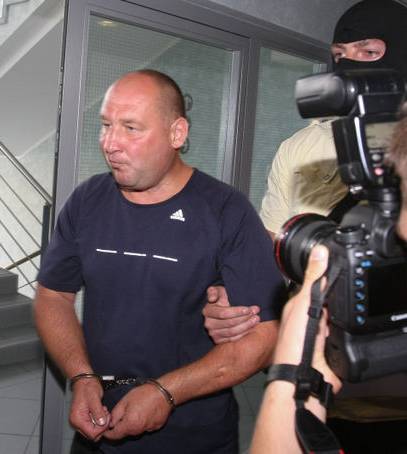
A Vilnius court on Tuesday sanctioned arrest of Stanislovas Narkevičius,
who is suspected of having assaulted a Filipino businessman in the town
of Trakai, 30 km from Vilnius. The man was arrested for two weeks.
"15 Minutes" photo. / Stanislav Narkevicius
Airinė Šerelytė, the court spokeswoman, confirmed to Baltic News Service (BNS) that the court had sanctioned arrest of Stanislovas Narkevičius, aka Narkuša.
Prosecutors had asked the court to arrest Narkevičius for three months.
On Monday, prosecutors launched an investigation into the assault of Andy Hernandez, 54, and his wife, 39. Hernandez owns a café in Trakai and his wife works as director there.
The incident took place at around 9:30 PM on Friday. A group of men entered the café and assaulted Hernandez and his wife. They were later both taken to hospital.
Narkevičius was detained for affray on Sunday. He faces up to two years in prison.
Žana Sokolovska, a prosecutor in charge of the investigation, told BNS there might be more suspects in this case.
Hernandez filmed the assault with his mobile phone and the video was published online. It shows one of the assailants cursing the café's staff.
- Bookmark :
- Digg
- del.icio.us
- Stumbleupon
- Redit it
17 years since execution of Vilnius mafia boss
- Posted by - (0) Comment
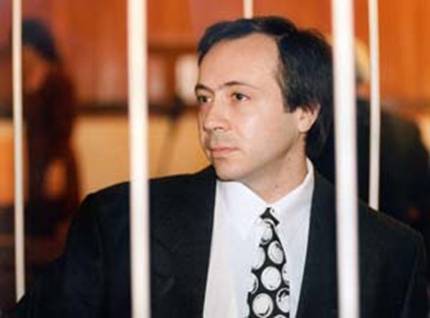
Boris Dekanidze, head of the "Vilnius Brigade", the last person executed by
Lithuania prior to its abolition of the death penalty in 1998.
Boris Dekanidze was the head of the "Vilnius Brigade" organized crime gang in Lithuania. In 1994, he was convicted of ordering the murder of a journalist and was executed. Dekanidze was the last person executed by Lithuania prior to its abolition of the death penalty in 1998.
Dekanidze was born in Lithuania to Georgian Jewish immigrants. He was a stateless person, not having been granted citizenship in Lithuania or Georgia. In Vilnius, he was a leader of the Vilnius Brigade mafia group.
In 1993, after receiving a number of death threats, Vitas Lingys, one of the founders and publishers of the newspaper Respublika, was shot at point-blank range near his home in Vilnius. Dekanidze was arrested and charged with ordering the murder, which police said was carried out by another mafia guy, Igor Akhremov.
In a 1994 trial, Dekanidze was convicted of deliberate murder by a three-judge panel. Dakanidze claimed he was innocent, and the evidence against him was primarily the testimony of Akhremov, who claimed to have carryied out the killing on Dekanidze's orders. On 10 November 1994, Dekanidze was sentenced to death and Akhremov was sentenced to life imprisonment.
Lithuanian authorities shut down the Ignalina nuclear power plant after a terrorist threat was made against it the day after the convictions were handed down. Dekanidze appealed the decision to the Supreme Court, but it ruled in February 1995 that there were no grounds for reviewing the death sentence. His appeal for clemency to President Algirdas Brazauskas was also refused.
Dekanidze was executed on 12 July 1995 in Vilnius by a single shot to the back of his head. The execution has been criticised at being carried out even as the Lithuanian parliament was debating abolition of the death penalty.
No one has been executed by Lithuania since Dekanidze's death. Lithuania abolished the death penalty for all crimes in 1998 after the Lithuanian Constitutional Court ruled that the death penalty was unconstitutional.
- Bookmark :
- Digg
- del.icio.us
- Stumbleupon
- Redit it
Mafia hitman set free
- Posted by - (0) Comment
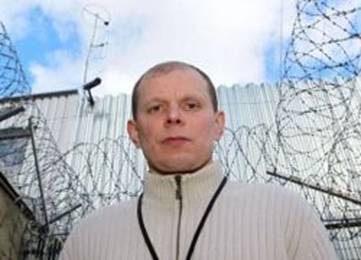
Igor Akhremov.
Igor Akhremov, a member of the criminal gang Vilnius Brigade who killed journalist Vitas Lingys in 1994 was released on parole in April this year.
Vilnius Regional Court overturned the ruling of Vilnius Third District Court and upheld Akhremov's appeal. On 2 March Vilnius Third District Court had rejected the offer of Vilnius Correction House to release Akhremov on parole. The Court said that upon his release the principle of justice would not be achieved as he serves for three extremely dangerous activities.
While Vilnius Regional Court satisfied the appeal describing him as a friendly and polite person, known for good behaviour in prison. Akhremov was assigned to the lowest risk group. The ruling of Vilnius Regional Court is final, not subject to appeal and comes into force immediately. In 1994, Akhremov was convicted for murdering journalist Lingys of the daily Respublika on 12 October 1993.
Boris Dekanidze, the then leader of the criminal gang Vilnius Brigade, who ordered the murder, was sentenced to capital punishment. At first, the court sentenced Akhremov to life imprisonment, but later the Supreme Court reduced the sentence to 25 years of imprisonment. His term of punishment was to expire in autumn 2018.
- Bookmark :
- Digg
- del.icio.us
- Stumbleupon
- Redit it
- Posted by - (0) Comment

Lithuania‘s economic growth in 2013 will be the highest in the region – 3,5 percent, according to the World Bank’s latest EU11 Regular Economic Report. Average economic growth in the EU11 countries is estimated to reach 2,5 percent.
The best performances are expected from Lithuania, Poland (3,2 percent), Slovakia (3,1 percent) and Estonia (3 percent). Latvia is projected to rank fifth with GDP growth of 2,9 percent.
The World Bank is expecting economic stagnation or a downturn in most of the 11 countries of Central Europe. GDP will shrink by 0,4 – 1,2 percent in Hungary, Slovenia, and Croatia, which aims to become an EU member.
Managing Director of “Invest Lithuania” Milda Darguzaite emphasizes the strong impact of successful fiscal reforms on growth. “Lithuania’s GDP growth is driven primarily by increasing domestic demand. Growing exports and investment, mainly into real estate, machinery and other equipment, is another accelerator of economic growth,” Darguzaite said.
According to the World Bank, Poland’s GDP will increase by 2,9 percent in 2012, the highest in the region. In Latvia and Lithuania, heavily affected by the economic crisis, GDP will rise by 2,3 percent. The World Bank forecasts 1,5 percent growth for the EU11 this year.
- Bookmark :
- Digg
- del.icio.us
- Stumbleupon
- Redit it
![]()

The global economy will expand 2.5% in 2012, according to the World Bank. It has significantly revised down its previous 3.6% outlook. Similarly, the global GDP growth outlook for 2013 has been reduced as well – from 3.6% to 3.1%.
GDPs in developing countries are expected to grow 5.4%, instead of 6.2% as projected earlier. Emerging economies will in turn expand only 2.4%.
It is expected that in 2012 world trade will grow 4.7%, not 6.6% as forecast before, World Bank says in its official statement.
The Bank points at the eurozone crisis and the global financial system’s vulnerability as the major risks the world will face this year.
Ref: 102.105.105.834
- Bookmark :
- Digg
- del.icio.us
- Stumbleupon
- Redit it
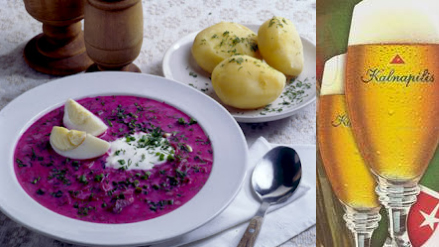
Lithuanian summer means Šaltibarščiai – cold beet root soup –
and a refreshingly cold beer!
Lithuanian summer traditions are different from what you usually find on European café tables or outdoors on a summer patio or garden. In particular, this applies to dishes Lithuanians gorge themselves with through hot summer months.
Take for example the cold beet soup, Šaltibarščiai, that you see pictured above. Take some time to read what our associate editor, Vin Karnila, writes about this and another, at least as famous Lithuanian dish....
‘Two Lithuanian dishes you simply have to try!’
To a great summer meal also belongs a refreshing cold beer. Look what Vin has to say about this foamy, beautiful Lithuanian brew...
- Bookmark :
- Digg
- del.icio.us
- Stumbleupon
- Redit it
 Ellen Cassedy |
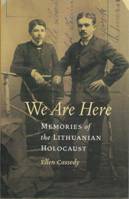 The book We are Here |
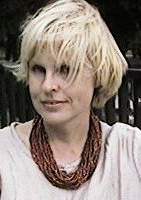 Daiva Markelis |
Professor Daiva Markelis, Illinois:
Essay/review of Ellen Cassedy's book We Are Here
I’ve always been interested in Lithuanian history and, lately, in Jewish-Lithuanian history. Jews have been living in Lithuania since the 1300s, have contributed to the work of nation building throughout the centuries, suffered alongside their Christian neighbors during the reign of the tsars. Despite their once considerable numbers—over seven percent of the population at one time—and formidable achievements, I don’t remember ever reading about them in Lithuanian Saturday School vadoveliai, readers filled with patriotic poems, variations of stories about the founding of Vilnius involving a dream about an iron wolf, and photographs of storks nesting atop the thatched roofs of simple country cottages. (Every year the same stork seemed to appear in yet another edition of the book.)
At home, my mother talked about a Jewish friend she’d had in Klaipeda. My father remembered a Jewish peddler who sold fabric and buttons. So, yes, Jews had lived in Lithuania, but only a handful over six centuries—that’s the impression I received. Soon after Lithuania regained her independence, I learned from my Aunt Birute about the once-thriving Jewish community in Dusetos: “This was a grocery store,” she said as we walked down Kazys Buga Street, “and here stood a bakery, and beyond that, over there, the best restaurant in town.”
I tell the Dusetos story to Ellen Cassedy, author of We Are Here: Memories of the Lithuanian Holocaust, recently published by the University of Nebraska Press, over coffee at the Corner Bakery. She nods: “The collapse of the Soviet Union made it possible for people to speak openly about what happened during the occupation. During both of the occupations, Communist and Nazi.”
- Bookmark :
- Digg
- del.icio.us
- Stumbleupon
- Redit it
 Ellen Cassedy |
 The book We are Here |
 Daiva Markelis |
Professor Daiva Markelis, Illinois: Essay/review of Ellen Cassedy's book We Are Here
I’ve always been interested in Lithuanian history and, lately, in Jewish-Lithuanian history. Jews have been living in Lithuania since the 1300s, have contributed to the work of nation building throughout the centuries, suffered alongside their Christian neighbors during the reign of the tsars. Despite their once considerable numbers—over seven percent of the population at one time—and formidable achievements, I don’t remember ever reading about them in Lithuanian Saturday School vadoveliai, readers filled with patriotic poems, variations of stories about the founding of Vilnius involving a dream about an iron wolf, and photographs of storks nesting atop the thatched roofs of simple country cottages. (Every year the same stork seemed to appear in yet another edition of the book.)
At home, my mother talked about a Jewish friend she’d had in Klaipeda. My father remembered a Jewish peddler who sold fabric and buttons. So, yes, Jews had lived in Lithuania, but only a handful over six centuries—that’s the impression I received. Soon after Lithuania regained her independence, I learned from my Aunt Birute about the once-thriving Jewish community in Dusetos: “This was a grocery store,” she said as we walked down Kazys Buga Street, “and here stood a bakery, and beyond that, over there, the best restaurant in town.”
I tell the Dusetos story to Ellen Cassedy, author of We Are Here: Memories of the Lithuanian Holocaust, recently published by the University of Nebraska Press, over coffee at the Corner Bakery. She nods: “The collapse of the Soviet Union made it possible for people to speak openly about what happened during the occupation. During both of the occupations, Communist and Nazi.”
Ellen had emailed me a few months earlier, having gotten my name from a mutual acquaintance who knew I’d be at the Association of Writers and Writing Programs Conference in Chicago. She is a warm, elegant woman with a crown of curly blond hair, a good listener and asker of questions, befitting her background as a journalist. I’ve been acquainted with her for all of thirty minutes and already she knows that both my first language and first husband were Lithuanian, that I’ve kept my maiden name, that my second husband is of Bohemian and Greek descent (and a keeper), that my parents immigrated to the United States in the 1940s, that I’ve visited Lithuania four times. I know that Cassedy’s Jewish great-grandmother had worked on a dairy farm, supervising the Lithuanian workers and keeping the books; that her grandfather had been a religious scholar, that he had escaped to the United States to avoid the czarist draft.
We’ve talked about the perils and pleasures of publishing books and the highs and lows of academic conferences.
“What do you think of Val Adamkus?” she asked, referring to the former president of Lithuania and a long-time resident of Hinsdale, Illinois.
“I love Adamkus. I used to work as a waitress at a golf resort he owned in Michigan back in the Seventies. He was a friend of my father’s.”
“Do you know Al Domanskis?” she continued.
“There’s one degree of separation for Lithuanians living in Chicago. So, yes.”
Domanskis is a prominent Lithuanian lawyer and activist involved in efforts to promote Jewish-Lithuanian dialogue.
Other Lithuanians we know (or know of) include Julija Sukys, whose Epistolophilia: Writing the Life of Ona Simaite, also published by the University of Nebraska Press, recounts the struggles of the Vilnius librarian who helped save Jews and was deported to Dachau; Ina Navazelskis, who works in the United States Holocaust Memorial Museum; and Saulius Suziedelis, the noted professor and historian who writes extensively about the Holocaust in Lithuania.
As our talk shifts to the Holocaust, I realize I’m a little worried for Ellen. Not all Lithuanians will greet her book with the interest, respect, and admiration of the above-named individuals.
“You’re going to receive some flak,” I say.
“Really?” she says, sounding sincerely surprised.
Perhaps I’m being presumptuous. I haven’t read the book yet, after all. And one of the blurbs on the back is by Adamkus, a man highly respected, even idolized, by a large number of diaspora Lithuanians. Adamkus writes that We Are Here "can help us to reach out, open our hearts, and rediscover one another in the spirit of mutual understanding."
But I know from experience that Lithuanian complicity in the Holocaust is a topic most Lithuanians wish would just go away. Some deny that Lithuanians were involved in the massive killings, despite countless eyewitness accounts and historical research from a wide range of highly respected scholars. Others bring up ethically questionable not to mention specious counter-arguments: “The Jews were communists and thus responsible for the take-over of Lithuania by the Soviets.” Still others fear that acknowledgment of any involvement will be seen by susceptible minds as an admission that Lithuania, a small, relatively poor country with a history of occupation, was the instigator of the Holocaust.
The most frequent response is that Lithuanians have endured their own significant losses: the massive deportations to Siberia; the death of family members to starvation and disease in that vast, unforgiving region; the enforced Russification of the entire country. “What about us?” is the sometimes unspoken reaction to real or imaginary accusations. The trauma of war, displacement, and occupation make it difficult to see beyond one’s own sufferings, to realize that victims can also be victimizers.
Back home in Charleston, Illinois, surrounded by cornfields and Baptists and a university newspaper whose motto is, somewhat inexplicably, Tell the Truth and Don’t be Afraid, I crack open We Are Here and am immediately drawn into the book’s narration.
Cassedy begins by describing her first days in Vilnius during the summer of 2004. One of her reasons for visiting Lithuania was to study Yiddish, the mother tongue of her forebears. I suspect that more than one reader will identify with her struggle to learn foreign syntax and vocabulary. How many individuals born in the United States or Canada to Lithuanian parents haven’t felt that seven cases for Lithuanian nouns are six cases too many?
Cassedy’s intimate beginning, with its emphasis on the intricacies of language learning, works to make readers more emotionally receptive when she shifts to what might be termed the more momentous reasons for her trip: to uncover family secrets about her Uncle Will, who served as a Jewish policeman, a morally controversial post, in the Siauliai ghetto during the Nazi occupation; and to chronicle how Lithuania has been dealing with its turbulent wartime past. Choosing to start with less “heavy” subject matter may be a carefully considered (and highly effective) rhetorical move, but it is also a hallmark of Cassedy’s chosen genre. We Are Here is not an academic history, nor is it a traditional memoir; it can best be described as an ethnographic chronicle of discovery, a book where personal experience is seamlessly integrated with in-depth interviews and formidable historical research. In addition, the sections about Uncle Will make this a detective story in the tradition of Dostoevsky’s novels, where the circumstances surrounding a crime create suspense but are ultimately less important than the psychological motives and moral dilemmas underpinning the perpetrator’s actions.
In We Are Here, Cassedy weaves a complex and colorful tapestry where certain themes emerge, then recede, then appear again. Her encounter with Steponas, an old man from her ancestral town of Rokiskis, who wants to “speak to a Jew” before he dies, parallels in some ways the anguished history of her uncle. Reading this section brought to mind the famous quote by Edmund Burke: “All that is necessary for the triumph of evil is that good men do nothing.” Steponas had been a witness to the executions, had done “a little” to help out his Jewish neighbors. Cassedy writes: “It seemed to me that it was his anguish about whether he could have done more that had led him to want to speak to me, and then to weep before me.”
The individuals Cassedy meets during her summer journey—Lithuanian gentiles, Lithuanian Jews, her fellow classmates at the language institute—are depicted with a writer’s eye for detail and a humanist’s desire for understanding the motivations of ordinary people. This doesn’t mean Cassedy is blindly accepting—there is nothing Pollyannaish about We Are Here. We see her irritation when someone says something contradictory or just plain idiotic, though this is almost always portrayed with raised eyebrows rather than harsh words.
We Are Here is not always easy reading. How could it be, with such serious, often tragic, subject matter? But it is not emotionally overwhelming reading. Cassedy structures her book so that readers can digest broader historical events and think about their implications while at the same time immersing themselves in the writer’s personal quest to unearth family information and navigate a new country. The writing itself is masterful— honest, uncluttered, evocative, and often highly poetic, as when Cassedy describes Rokiskis: “My ancestral home. Except for the trilling of birds, the town seemed hushed, suspended like a held breath. There was so much air. Somehow my images of the past hadn’t allowed for so much blank space.”
This is an especially important book for English-speaking Lithuanians who live in the West and are unaware of the slow but steady progress that is being made in Lithuania with coming to terms with what happened during the Holocaust. There is so much to learn, so much that needs to be done in terms of writing Lithuanian Jews back into the history that had been so brutally taken away from them. We Are Here is a great starting point.
|
|
Ellen Cassedy traces her Jewish family roots to Rokiskis and Siauliai. Her new book, We Are Here: Memories of the Lithuanian Holocaust, was published in March and will appear in Lithuanian soon. She lives in Washington, D.C. Visit her website at www.ellencassedy.com.
|
|
|
DAIVA MARKELIS Born in 1957 in Chicago to Lithuanian immigrant parents and raised in Cicero, Daiva Markelis has found unexpected contentment amidst the cornfields of Central Illinois. She is an associate professor of English at Eastern Illinois University, where she teaches creative writing, composition and rhetoric, women’s memoir, and myth and culture. She is a cofounder of Past/Forward, a memoir-writing group open to the public that meets twice a month and consists of ordinary people, many of them retired, writing moving, insightful, often humorous life stories. |
|
Daiva received her doctorate from the University of Illinois at Chicago in Language, Literacy, and Rhetoric. Her dissertation deals with the literacy habits and oral traditions of Lithuanian immigrants; chapters have been published in the journals Written Communication and Lituanus, and in the edited volumes Ethnolinguistic Chicago and Letters across Borders: The Epistolary Practices of International Migrants. Daiva has presented her research at the Modern Language Association, the Conference on College Composition and Communication, the Association for the Advancement of Baltic Studies, and the National Council of Teachers of English. She has also written several academic papers in her native Lithuanian. Her master’s degree is in English with a specialization in creative writing, also from the University of Illinois at Chicago. Daiva’s short stories have been published in Cream City Review and Other Voices. Her creative nonfiction has appeared in The Chicago Tribune Sunday Magazine, The Chicago Reader, Crab Orchard Review, Writing on the Edge, Women and Language, Mattoid, Agora, and Fourth River. Mongrel Tongue was a finalist in the 2007 Arts and Letters competition in creative nonfiction. The Lithuanian Dictionary of Depression was a runner-up in the 2009 American Literary Review creative nonfiction contest. The Review published the essay in its Spring 2010 issue. Daiva is married to Marty Gabriel, a retired social worker for the Chicago public schools and a top-ranked Scrabble player. Marty and Daiva have appeared in Scrabylon, Scott M. Petersen’s documentary about tournament Scrabble. Daiva cheers for the White Sox. She loves to knit, scrap-book, read, and listen to music, everything from Bach, Beethoven, and Brahms to bebop, bluegrass, Brel, the Band, and the Black Eyed Peas. Her favorite color is red, her spirit animal is a polar bear, her astrological sign is Capricorn. She wants a puppy for Christmas.
|
|
- Bookmark :
- Digg
- del.icio.us
- Stumbleupon
- Redit it
- Posted by - (0) Comment
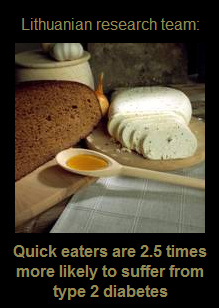
Your parents must have told you a thousand times - don't eat so fast, slow down! Now it appears that scientific research is backing them up. At the recent joint International Congress of Endocrinology and European Congress of Endocrinology in Florence, Italy, a research team from Lithuania presented their research showing that people who eat their food quickly are 2.5 times more likely to suffer from type 2 diabetes than those who take their time during meals.
The research team led by Dr Lina Radzeviciene from the Lithuanian University of Health Sciences scientifically determined for the first time the role that eating speed has as an independent risk factor for type 2 diabetes.
Diabetes mellitus is a very common disorder caused by high levels of sugar in the bloodstream. It affects approximately 6.4% (285 million) of the worldwide population and is associated with an increased risk of heart attacks, stroke and damage to the eyes, feet and kidneys.
Europe alone counts more than 25 million people with diabetes. In most countries, diabetes is now one of the leading causes of death through its effects on cardiovascular disease: 70% to 80% of people with diabetes die of cardiovascular disease. Diabetes is ranked among the leading causes of blindness, renal failure and lower limb amputation, and type 2 diabetes represents between 85% and 95% of cases of diabetes. The total cost of caring for people with diabetes in Europe is estimated between EUR 28 billion and EUR 53 billion per year.
Dr Lina Radzeviciene commented: 'The prevalence of type 2 diabetes is increasing globally and becoming a world pandemic. It appears to involve interaction between susceptible genetic backgrounds and environmental factors. It's important to identify modifiable risk factors that may help people reduce their chances of developing the disease.'
This is not the first time that Dr Radzeviciene's team made a breakthrough in the area of diabetes research. They previously found that coffee consumption (four or more cups a day) significantly decreased the risk of developing type 2 diabetes. They also found that smoking and egg consumption (more than five eggs a week) increased the risk.
- Bookmark :
- Digg
- del.icio.us
- Stumbleupon
- Redit it
200 years since Napoleon arrived in Lithuania
- Posted by - (0) Comment
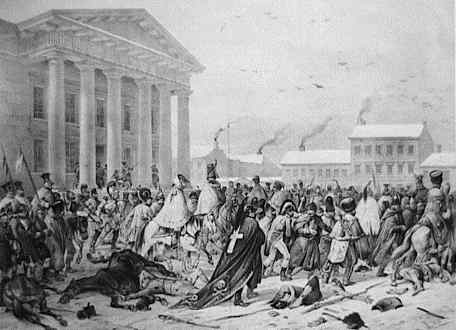
French Army in the Town Hall Square of Vilnius, Lithuania, 1812
By Jonas Damelis (1780—1840), a neoclassicist artist
associated with the School of Art at Vilnius University
By Vytautas J. Šliūpas
Two hundred years ago – on June 24, 1812, the French Grande Armée, led by Emperor Napoleon Boneparte, crossed the Nemunas River near Kaunas and invaded Czar Alexander I's Russia. I will not attempt to delineate the historical facts that are well known, but will present several episodes which deal with Lithuania and Lithuanians. Readers may be interested to know these facts, because Napoleon's first and last steps of the Russian campaign were taken in Lithuania.
- Bookmark :
- Digg
- del.icio.us
- Stumbleupon
- Redit it
VilNews e-magazine is published in Vilnius, Lithuania. Editor-in-Chief: Mr. Aage Myhre. Inquires to the editors: editor@VilNews.com.
Code of Ethics: See Section 2 – about VilNews. VilNews is not responsible for content on external links/web pages.
HOW TO ADVERTISE IN VILNEWS.
All content is copyrighted © 2011. UAB ‘VilNews’.

 Click on the buttons to open and read each of VilNews' 18 sub-sections
Click on the buttons to open and read each of VilNews' 18 sub-sections 




















.jpg)



